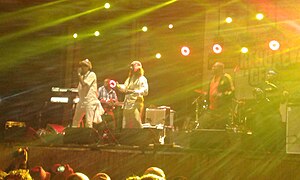Super Cat
| Super Cat | |
|---|---|
 |
|
| Background information | |
| Birth name | William Anthony Maragh |
| Also known as | Wild Apache |
| Born |
25 June 1963 Kingston, Jamaica |
| Genres | Reggae, Dancehall, Reggae fusion, Hip hop |
| Occupation(s) | Deejay |
| Instruments | Vocals |
| Years active | 1981–present |
| Labels | Columbia/SME Records |
Super Cat (born William Anthony Maragh in Kingston, Jamaica, 25 June 1963) is a deejay who achieved widespread popularity during the late 1980s and early 1990s dancehall movement. His nickname, "Wild Apache", was given to him by his mentor Early B. He is the elder brother of reggae artist Junior Cat and is considered one of the greatest deejays within the Jamaican dance-hall scene to date.
Born to a Black mother and Indian father, Super Cat was raised in Kingston's tough Seaview Gardens neighbourhood, then known as Cockburn Pen, home to ground-breaking deejays like Prince Jazzbo and U-Roy. At the age of seven the Soul Imperial sound system allowed him to assist them at a local club called Bamboo Lawn. He auditioned for Joe Gibbs as a singer but was unsuccessful.
He began appearing as a deejay under the name Cat-A-Rock, but soon switched to the name Super Cat. He also appeared as 'Wild Apache'. His first single "Mr. Walker", produced by Winston Riley, was released in 1981 and established his recording career. He went on to record for Jah Thomas ("Walkathon", on which he was billed as 'Super Cat the Indian'), but his career was interrupted by a period of incarceration. After his release he began working with Early B on the Killamanjaro sound system in 1984, and his debut album, Si Boops Deh!, was released in the mid-1980s, and included the hit singles "Boops" (which was based on Steely & Clevie's updated "Feel Like Jumping" rhythm and sparked a craze for songs about sugar daddies), and "Cry Fi De Youth", establishing his style of dancehall with conscious lyrics.
He started his own Wild Apache Productions label and began producing his own recordings, including the 1988 album Sweets for My Sweet. He featured on the album Cabin Stabbin in 1991 along with Nicodemus and Junior Demus. He had been scheduled to perform at the One Love concert in the UK in 1991, but his appearance was cancelled after the shooting death of Nitty Gritty, for which Super Cat was initially suspected but cleared in 1992. Continuing success saw him move to the United States and sign a contract with Columbia Records, releasing one of the first dancehall albums on a major label, Don Dada (1992). The following year, Sony Music issued The Good, the Bad, the Ugly, and the Crazy, teaming Super Cat with Nicodemus, Junior Demus and Junior Cat.
...
Wikipedia
